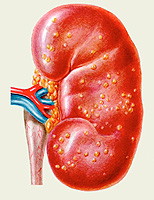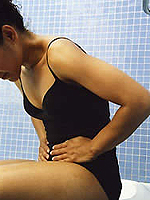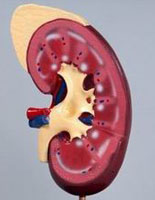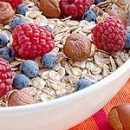Treatment of chronic glomerulonephritis is the appropriate mode, diet, the use of drugs and should be strictly individualized depending on the shape, stage, phases, frequency of exacerbations, the presence of concomitant diseases.
Content
Treatment of chronic glomerulonephritis
Patients should avoid overwork and supercooling. They are contraindicated with heavy physical work, work in the night shift, outdoors in the cold season, in hot shops, in stuffed premises. Perhaps the patient should be recommended daily rest lying within 1-1.5 hours.
In the event of an additional disease, it is recommended to comply with the beddown, appropriate therapy, if necessary, the purpose of antibacterial agents (antibiotics that do not possess nephrotoxic effects). To prevent exacerbations and stabilization of the patient's condition, a sanation of chronic infection was needed.
 For women with chronic pyelonephritis, pregnancy is always a serious test and can threaten the exacerbation of the process in the kidneys, the appearance (or increasing) hypertension. With nephrotic form and, especially, the presence of hypertension Pregnancy is contraindicated. Especially it is dangerous in violation of kidney functions.
For women with chronic pyelonephritis, pregnancy is always a serious test and can threaten the exacerbation of the process in the kidneys, the appearance (or increasing) hypertension. With nephrotic form and, especially, the presence of hypertension Pregnancy is contraindicated. Especially it is dangerous in violation of kidney functions.
Importance of diet. General requirements for diet, regardless of the form of nephritis: restriction (up to a complete exception) of a table salt, extractive substances, spices, alcohol; Appointment of full-fledged vitaminized food. Patients useful to eat watermelons, melons, pumpkin, grapes.
Treatment with antibiotics is used only when aggravating chronic glomerulonephritis, the occurrence of intercurrent diseases, the exacerbation of the inflammatory process in the foci of infection and during hormone therapy.
The latent form (hidden) chronic glomerulonephritis (especially without exacerbation) does not require special restrictions in the mode and nutrition, except the above concerning all forms of jade. Power must comply with physiological needs with a slight limitation of the cook salt (up to 6-8 g per day). Liquid use do not limit. In the remission (weakening of symptoms) there is no need for medication therapy.
Patients with a latent form of jade are subject to dispensary examination 1-2 times a year: measuring blood pressure, general analysis of blood and urine, Kakovsky - Addis, the definition of daily proteinuria, assessment of the functional state of kidneys for endogenous creatinine clearance.
In the aggravation phase of chronic glomerulonephritis patients are treated in the hospital, antibiotics are used, diet No. 7a, 7 are prescribed; exclude the table salt or limit to 2-4 g per day, follow the water balance. Pathogenetic and symptomatic therapy is prescribed.
Patients of the nephrotic form of chronic glomerulonephritis should adhere to the gentle regime. In the food diet, the reception of the table salt is limited to 2-4 g per day, and periodically (for 1-1.5 months) completely exclude it. Strictly followed by water balance: the amount of liquid consumed per day should be equal to the volume of urine selected for the previous day plus 300-500 ml (no more). The amount of protein in the daily diet with the saved kidney function should correspond to the physiological necessity plus the amount that the patient loses with urine. If there are edema, unloading days are 1-2 times a week with apple or potato-apple diet.
As symptomatic therapy, a diuretic with various mechanism of action is prescribed. Hypothiazide, furosemide. To prevent the development of hypokalemia simultaneously with diuretic drugs, potassium preparations are prescribed.
Upon exacerbation of the nephrotic form of chronic nephritis, a good effect has a long-term use of Hinghamine (provided that there is no sharp hypertension). In the hypertonic and nephrotic form of chronic glomerulonephritis, symptomatic therapy hypotensive (reserpine, etc.) and diuretic. In the compensation stage of these forms of the disease, a nice effect gives sanatorium-resort treatment.
Uremia (accumulation of urea blood) is particularly particularly given to the fight against azotemia (excessive content in the blood of nitrogen-containing protein metabolic products). Reception of protein with food is limited to 18-30 g per day, mainly due to meat. Assign antibiotics of a wide range of action and fermented efficiency (for suppressing rotting in the intestine). In the absence of edema, abundant drink is recommended. To remove the phenomena of intoxication, prescribe vitamins of group B, glucose, ascorbic acid, stomach washing, enema with sodium bicarbonate, and hemodialysis is carried out using the device «Artificial kidney». Currently, the successful development of kidney transplant operations is underway.









